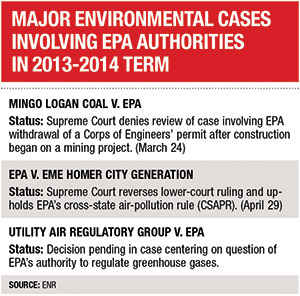
Industry observers say that the low cost of natural gas, as well as regulatory actions by the Environmental Protection Agency, could temper the immediate impact of the Supreme Court's April 29 ruling that upheld an air-quality rule for emissions that move across state lines.
Still, the EPA contends the Cross-State Air Pollution Rule (CSAPR) would require some $800 million annually in powerplant retrofits, mostly in upwind states. Some sources argue the court's decision may embolden the agency to interpret its Clean Air Act authority broadly in future regulatory actions.
In EPA v. EME Homer City Generation, the High Court ruled 6-2 to uphold the rule. Writing for the majority, Justice Ruth Bader Ginsburg said, "EPA's cost-effective allocation of emissions reductions among upwind states, we hold, is a permissible, workable and equitable interpretations of the Good Neighbor Provision" of the CAA. Justices Scalia and Thomas dissented.
EPA says it is reviewing the opinion, and no immediate action from states or affected sources is expected. In the meantime, the Clean Air Interstate Rule, issued by the George W. Bush administration, remains in effect.
Andy Byers, Black & Veatch associate vice president of environmental services, says the flat demand for power and the affordability of natural gas are doing more to push coal-plant retirements than any regulation. Byers says, "When you consider all the retirements that will go into effect, which will take a lot of the emissions out of the air … EPA may want to go back and rework some of the requirements of CSAPR."
Jeff Holmstead, a former chief of EPA's Office of Air and Radiation, concurs. Utilities and energy companies were concerned when the cross-state rule was finalized because of the tight compliance deadline. But Holmstead notes, "The rule has been on hold for almost three years." In that time, energy companies have aggressively installed pollution controls, in many cases to comply with the standards for mercury and air toxics, which take effect in less than a year and which were upheld by a federal appeals court in April.
Michael Wara, an associate professor at Stanford University Law School, which filed an amicus brief on behalf of EPA in the case, says, "The court basically deferred to EPA's expertise in managing a multi-state air-quality program." The decision gives EPA "comfort in flexibly interpreting the portion of the Clean Air Act that they are using to roll out these new regs for existing [powerplant] greenhouse emissions," Wara adds.
But Holmstead, now head of Bracewell and Giuliani's environmental strategies group in Washington, D.C., says, "Nothing the Supreme Court has said is going to have any impact on what EPA is going to propose in June."


Post a comment to this article
Report Abusive Comment